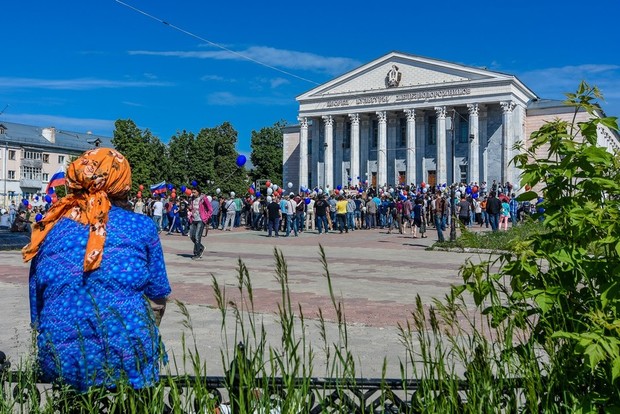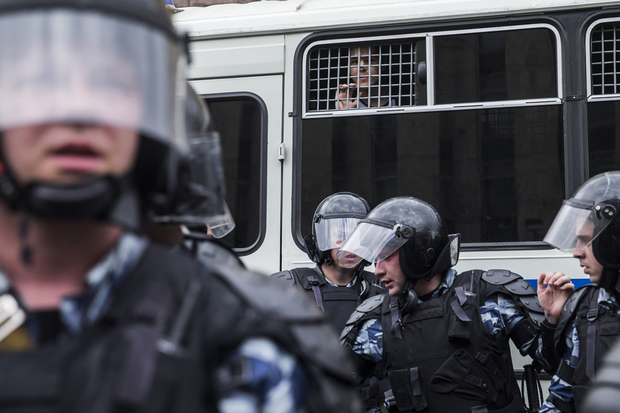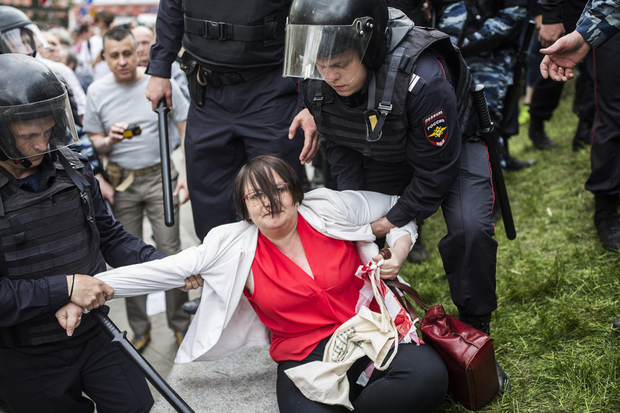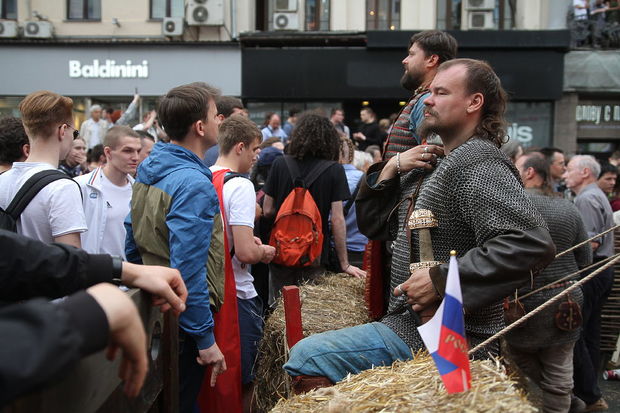Boris Kagarlitsky: ''The Kremlin was underwhelmed by how the capital authority behaved at the rally''
The opinion of the famous sociologist about the opposition rallies in Russia
12 June was marked by protests that swept the country. The parallels with the pickets on 26 March naturally arise. Despite the external similarity, there are still many differences. Director of the Institute of Globalization and Social Movements (IGSO) Boris Kagarlitsky has identified several lines of relations in these processes: the center -regions, the authority — the opposition, and the Kremlin — Moscow government. Read more in his column written specially for Realnoe Vrmeya.
Regional factor
The main difference between the rallies on 12 June and the protests on 26 March is regional conditions. This time, most part of the regions perhaps with reluctance and constraints but legalized these meetings. Of course, there were all sorts of questions such as very early time in the morning of the meeting in Kazan (Yudino settlement, from 7 a.m. to 9 a.m. — editor's note). Everyone inevitably wondered: ''Isn't it too strange place and time assigned for the meeting?''
However, there is also an obvious fact that both sides reached a compromise, deeming it acceptable, and in any case the organisers agreed this meeting with the authority. I think that it is important common dynamics, which the Kremlin has underestimated. But when they understand it, it can be too late.
It is absolutely clear that the regional bureaucracy has made certain conclusions after 26 March. The main one is that they do not want to risk their necks and to engage in these political games, which are very important for Navalny and the Kremlin but are absolutely not their business and not their own struggle for provincial officials.
Apparently, the provincial activists are guided by the same logic, and the regions do not behave like those do in the capital city. This gap in the political process of regions and capitals was clearly designated on 12 June, by the dynamics exists here and there. These dynamics are quite interesting and contradictory: if in the regions there is being a very slow democratization and revival of public life, in the capital there is a crackdown.

Attractive unauthorization
In Moscow and Saint Petersburg, Navalny managed to consolidate the success but failed to develop it. There are many people who are willing to come to a meeting at the call of Navalny. This time in Moscow we have seen no fewer people than on 26 March. Most importantly, in the capital city these people were ready to go to the rally regardless of whether it was agreed or not, without fear of clashes with the police.
Moreover, there is a certain part of young people, for whom particularly the unauthorized nature of a rally is appealing. While the rally was supposedly authorized, there was a certain demoralization of the young activists who wanted to see the 26 March, who accused Navalny of that he ''betrays'' the protest by making it legal in Moscow. And it is contrary to the opinion of the journalists who sincerely believe that Navalny leads the youth under the batons. But the real situation is developing the opposite way: it is young people who want to go on radical and unauthorized meetings, but FBK leadership has to follow after its core group because otherwise it will lose them.
In its turn, the authority acted rather rough because they could force Navalny to hold a legal meeting if they themselves behaved correctly and did not give him a reason to cancel existing agreements. Again, by acting more toughly on Tverskaya Street than on 26 March the police fueled the youth even more because, on the one hand, the police beat and arrested, on the other hand, in Moscow there are 20-30 thousand young people for whom it is in some sense a buzz. If someone thinks that it is possible to frighten people this way, they are very wrong. On the contrary, people were angered and provoked to further radicalization.

The Bonapartist decision of Navalny
The transfer of the rally to Tverskaya Street has a peculiar feature of Moscow. In the capital city there are two waves of protest. The first one is a political protest, which Navalny does. The second one relates to people's indignation about the policy of Moscow government — not only at the notorious programme of demolition of five-story buildings but also at a number of other circumstances that cause discontent of the citizens. The social protest was going parallelly and separately. The two meetings, which took place at the end of May, are very typical: one was more politicised, the other was less politicised, although both of them were attended by the same people.
However, the fundamental task of Navalny in relation to the capital city was to try to combine these both processes and to lead them or at least coordinate. This task has not been fulfilled. Moreover, it has largely aggravated. The problem is not the act of the meeting itself, although the participants of social protest do not want to go to an unsanctioned rally. But there is more important reason: Navalny's decision was taken without the consent of the other protest groups.
If to pay attention to the statement in Facebook of Yuliya Galyamina (one of the leaders of the movement against the local government, against the notorious renovation programme), who encouraged people to go to Sakharov Avenue, it was very typical. She asked not to confine to Sakharov Avenue. She bluntly explained her position by the fact that Navalny had no democratic consent of other initiators, he held no discussions with the activists, he took the decision unilaterally. This position of Navalny does not seem credible to other leaders of the protest. It provokes disunity at the next stage. Next time, if the leaders of the protest do something together, they will require warranty from the same Navalny, who will be treated suspiciously.
The problem of Navalny is not whether he acted as an authoritarian, after all in the conditions of a conflict one needs to take decisions quickly, there is not always technical time to discuss everything with everyone and carry out all democratic procedures. But the leader can take such an authoritarian decision only when he has already earned their trust. When there is an understanding, no matter he is right or wrong, but he does have such authority when it is pointless to argue.

Such a Bonapartist type of behaviour can be justified in the struggle for power and technically can be right, but it works effectively only when there is trust. Navalny began to act ''Bonapartisty'' long before the proper level of trust is established. This is absolutely not an issue of radicalism because the same Galyamina eventually went to Tverskaya Avenue, was beaten (besides, she had previously held an unsanctioned rally near the State Duma). The problem is the level of trust.
I think that Navalny received some disadvantages. Relatively speaking, he won by points, but there was a significant cost for this kind of decision.
The Kremlin vs Moscow government
Besides, there was an inkling that the Moscow government deliberately used these disturbances in order to punish those people with whom she is in conflict. First, the attack on Galyamina is unclear. She came to the end, she was severely beaten. I was there and saw everything: at first, the police, of course, did not commit atrocities, there was no sadistic violence, but in relation to Galyaina there suddenly was a beating right on the street.
Another similar episode: a member of the Civic Chamber of Russia Georgy Fedorov, one of the organizers of the rally on 27 May, was standing apart from the crowd on the steps of the hotel Armeniya and was just watching. Suddenly OMON officers jumped out from the crowd, went in the opposite direction from the crowd, took Fedorov and pulled him into a police van.
There was an impression as if someone of the officials gave the order to catch specific individuals and deal with them. In my opinion, it is very illustrative. Apparently, this was noticed in the Kremlin.
According to some signals that appear in the mass media, now the Kremlin inclines to separate its position from the local government. If something goes wrong, the local government will be responsible for everything, not the central government. Moreover, it is quite reasonable because the local government showed the initiative and went beyond its powers. At least, there are such rumours in the political community. The Kremlin was underwhelmed by how the local authority behaved. Peskov in his statement partly confirms this version.

We also see another line — not very easy relationship between the presidential administration and the Moscow government. If serious problems arise, the central government will say that the Moscow government itself took this decision, it itself brought to a conflict, created a lot of problems.
The municipality has created a conflict situation connected with the transfer of the festival Times and Epochs to Tverskaya street, where it is even technically impossible to hold a similar event. This festival, where people allegedly came, is usually held somewhere in Kolomna or another large park. But a narrow space of Tverskoy Boulevard and Tverskaya Street ush all of these stands and designs. Even if there were no protests, no rallies, this is an extremely uncomfortable place, where it would be difficult to move for a crowd. All this was done ex post facto — after it became known that Navalny would bring these people to the street (he warned a month before it). It is a provocation on the part of the municipality, and the decision of the city authority was taken at least at the technical level. The Kremlin can tell the local government: ''Yes, we can't blame you for how you behaved in relation to the protests, but you failed the festival.''
Some political implications for the local government sooner or later will appear, most likely not now. If there are be new introductories, Sobyanin's team can be reminded all of this.
Also, I would like to note that the spring-summer political campaign will gradually fade because everyone wants to rest — officials, oppositionists and activists. In summer from mid-July usually all gradually extinguishes. But the socio-economic and psychological processes will not stop, and by the autumn we won't be quite the same as we were in the spring: something is going to happen next. In this sense, it is clear that the process is impossible to pause. Social problems that are growing in the regions will not be absolutely quiet and uneventful. Events will occur. A pause may be in Moscow, but not across the country. The dynamics will not stop.